
Tuesday, May 24, 2011
PHOTOS |
COMING SOON|
EXAMINER.COM FILM ARTICLES
||HOME
MOVIE REVIEW
The Tree Of Life
In Life,
The Father(s), The
Son And The DNA Of Why

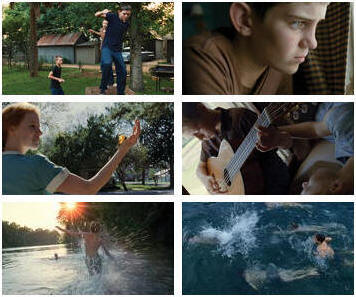
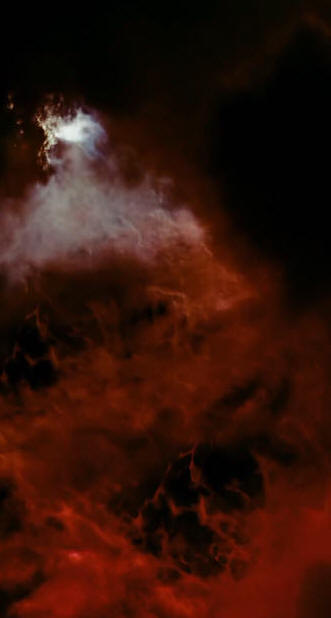
Images from Terrence Malick's Palme D'Or-winning drama "The Tree Of Life" .
Fox Searchlight
by
Omar P.L. Moore/PopcornReel.com
 FOLLOW
FOLLOW
Tuesday,
May 24, 2011
Did you ever ask a question about why things happen the way they do? Why
is a newborn child so cute? (Or quite often so darn ugly?) Why can
someone forgive the murderer who has altered their family forever? Why can
you survive extreme trauma and others can't or don't? Does a higher power
ever figure in? Does believing in love pay off? Or does having faith
alone get you through? Or is it just life's lucky and unlucky rolls of the
dice? Are these questions relevant in the grand scheme of things?
If any of this and other conundrums and curiosities interest you, then if
nothing else you will be fascinated by "The Tree Of Life", a stunning and deeply
beautiful cinematic presentation that opens this weekend in New York and Los
Angeles and expands around the U.S. and into Canada beginning in June, with wide
release across North America on July 8. Terrence Malick directs this epic
drama, which
won the Palme D'Or this week albeit amidst
reportedly considerable controversy amongst some in the Cannes Film Festival
jury headed by Robert De Niro.
At the start we hear whispering voices. We see undulating spectra.
Soon we are in Midwestern America in the rather staid, very conservative 1950s.
Cameras, hand-held and Steadicam, follow a family of five. The mother and
father love, or at least used to love each other, but now hardly converse at
all. Their three young boys speak for them. The boys are the space
and meaning that defines the couples' lives. The images early on are
energetic and idyllic but also ragged and abrupt as we familiarize ourselves
with the O'Briens.
The father, aka Mr. O'Brien (Brad Pitt), doctrinaire and distant, works at a
machinist plant which he apparently owns. He has patents for his business.
Ownership is key, he tells one son. We gain little knowledge of his
surroundings at work -- only that he seems muted, desperately alone and isolated
-- and dwarfed by his isolation. Mr. O'Brien's belief in the Lord appears
to restore him and at home he's animated but disciplined when with his family.
He appears to act out (for some, the acting out occurs at work.) The
father is activated by a religious righteousness borne out of a tense
relationship with a surrogate, omnipresent father. Mr. Malick chronicles
this well, and shows us that the generational struggle between fathers and sons
are present across all forms of life.
The mother, aka Mrs. O'Brien (Jessica Chastain), is more or less a type of
"Suzie Homemaker", working hard to preserve and protect the home while enjoying
the company of her three beautiful sons. But there's something missing.
There's a muted sadness that swirls around the O'Briens' metaphorical white
picket fence of security, innocence and Norman Rockwell-like homestead.
Jack, the eldest O'Brien son, played so memorably by Hunter McCracken, has
experienced loss and it affects him deeply. He's smart, and always looks
as if he is thinking. As if he is pained. As if he is internalizing
what he sees around him and what his father says and does. The weight of
the world is on his shoulders. As Jack grows older (played by Sean Penn),
that burden continues. Or is it that the mature Jack is merely thinking
back to his childhood? Rodin surely wouldn't know the answer. Is Mr.
Malick's film one huge flashback?
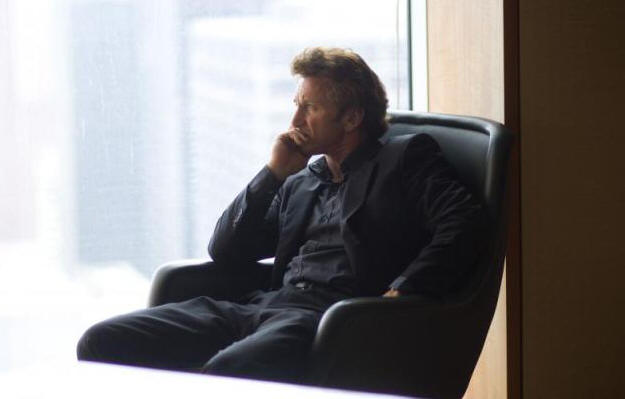
Sean Penn as older Jack in "The Tree Of Life" .
Merie Wallace/Fox Searchlight
The mournful, exploring, older Jack is a lonely,
disappointed figure. He's an occupational success in life as an architect
but not necessarily a personal success at love. There's a deep sadness and
regret to him, a feeling of missed opportunities to get to know the father (or
is that Father?) who taught him to be strong. Jack is haunted if not
tortured by the whys, hows and unanswerables.
When Jack whispers, whether as young Jack or contemporary Jack, it may seem as
if all the hosts of heaven and earth -- all the life forms known to humankind --
can hear him clearly. But can He hear Jack? We don't necessarily
"see" God or even glimpse an approximation of an image that the higher power may
take. (Atheists may not glimpse anything at all.) Is Jack calling
out in vain? Are his prayers going unheard as well as unanswered?
Are his questions infinitesimal? Or infinite? Or fruitless?
Since thoughts and questions -- principally those of Jack, an always-searching
soul, an innocent but scarred child/man -- are the backbone of "The Tree Of
Life", it scarcely matters whether a narrative connection with the O'Brien
family is generated beyond the most elementary of ways for the viewing audience
to identify with the characters that Ms. Chastain (excellent in a role where she
is virtually mute as an abused figure), Mr. Pitt and Mr. Penn play. Mr.
Pitt is precise, methodical and effortless as Mr. O'Brien in a performance that
keeps us off guard with threatening bursts of anger. Mr. Penn is good in
sequences that ironically work as a stress reliever from the deeper questions of
the film. I wasn't distracted for a single second from this film, and I
wanted more after it ended.
"The Tree Of Life" is life-affirming even as its central character Jack probes
the whys of life and of where he and his Lord and Savior stand. Jack has a
relationship with two fathers. One he sees and can't speak to unless
spoken to. The other he can't see but can feel and speak to.
Arguably and ironically, it is this second father who is more powerful and maybe
more abusive than the first. Jack's father (Mr. Pitt) also has a
relationship with a higher power but in light of his rough, aggressive and
abusive ways it appears to be a surface or uneasy relationship, one that is
selfish, operating strictly to shield himself from his own wrongdoing instead of
investigate and take responsibility for it.
Throughout, Jack is a constant and his troubled conscience remains steady.
Jack is forever chasing an elusive shadow of identity and harmony both within
and without him. Does he learn and grow? What does he become?
Mr. Malick's epic cerebral adventure is about many things, including living life
as a choice between "nature...and grace", as one of the film's characters says.
We wander with Jack, a nomad in his own internal adventures, struggling to find
balance, to find what it is that anchors him in life, whether that thing or
things is faith, father, mother or all the above. Jack's entreaties are
quietly desperate, almost prayer-like. "The Tree Of Life" explores life,
existence and awareness the way
"Eyes Wide Shut" explored fidelity, albeit
without an art-house gloss. Stanley Kubrick's final film was gravely
underrated by some before it received greater respect and appreciation by
critics and audiences alike, and I feel that Mr. Malick's latest film will be
received in much the same way.
"The Tree Of Life", which was to have shown at the 2010
Cannes Festival but wasn't quite ready, is essentially divided into several
poetic verses punctuated and demarcated by luminous imagery. Life is
short, and one of the most important things about "The Tree Of Life" is that the
human place in the universe of life as it is lived is ephemeral and almost
trivial, hence the considerable sequences of other life forms, planets and
liquids that consume the screen. If, as in Danny Glover's
"Grand Canyon"
character's eyes our time as humans "means diddly to those rocks" then "The Tree
Of Life" amplifies that notion tenfold yet isn't nearly as outwardly cynical.
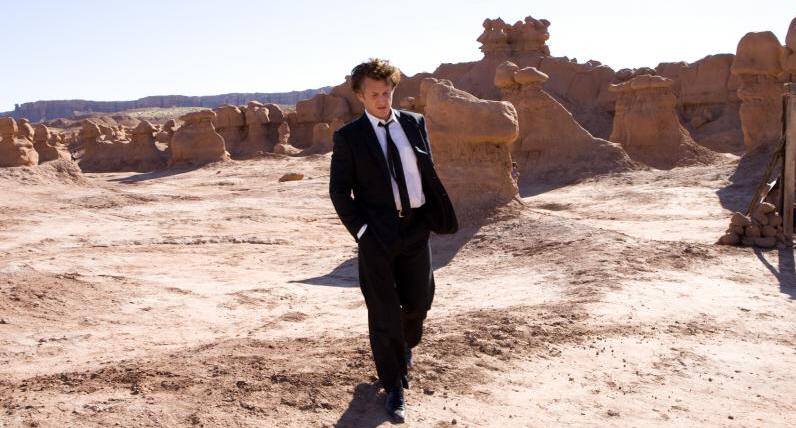
Sean Penn as older Jack in "The Tree Of Life",
written and directed by Terrence Malick .
Merie Wallace/Fox Searchlight
For some reason while writing this review over the past weekend I listened to
George Michael's song "You Have Been Loved". There's something about the
song's lyric, "so if it's God who took her son, He cannot be the one living in
her mind", that resonates with me and exemplifies what I believe may be a
thought of the largely silent mother figure in Mr. Malick's film. Mother
O'Brien, played by Ms. Chastain, speaks a few times but her words are
well-chosen. The mother has presumably accepted the harshness of life even
if she hasn't completely come to terms with it. She apparently doesn't
subscribe to any religion, although she may well believe in God. We
obviously can't tell that God lives in her mind, though what is clear is that
she believes in love, and believes in it in its purest form. She feels it
and believes in it. She shares that love with her sons. It's such a
beautiful thing to watch.
Mr. Malick's film moves swiftly as it muses with purpose and feeling. You
observe and feel the pain, the discoveries, the joys, the lows of the film's
significant moments without being cued to feel them. "The Tree Of Life"
never condescends, always respecting its audience.
There's a push and pull throughout the film in its visual and music choices,
including Alexandre Desplat's wonderful score and the music of Brahms. The
director doesn't reconcile these stylistic tensions in order to come to a
conclusion but only to present, observe and absorb them as they come to
represent the differences in character within a family. Mr. Malick offers
the competing choices of the process of living life in a complete and thorough
manner.
"The Tree Of Life" though, isn't about family as much as about the questions,
events and internal issues that put it on trial in Jack's view. The film
isn't solely about the drama that familial fissures create. "The Tree Of
Life" is mostly about how a lack of love clouds thought and rational behavior
while creating bitterness and distance. The film is about how strident
devotion to principles and the rigidity of order often shatters love, and how
even deities that seemingly operate to provide larger guidance and safety move
with an unseen hand that is as flawed as nature itself is.
To answer the unanswerable, to grasp the unknowable means to penetrate questions
that cease to have any meaning beyond their utterance. To this end, "The
Tree Of Life" is a consistently engaging exercise, and in posing the questions
it is wonderfully alive.
As with much of Terrence Malick's work the
visions of his very personal films are intimate enough for art house
presentation but grand and compelling enough to be exhibited on large multiplex
screens. The latter is where Mr. Malick's new film solidly deserves to be.
Those who love Brad Pitt and go into "The Tree Of Life" expecting Brad Pitt the
movie star will come away having been immersed in a very different kind of
experience than they may be accustomed to, though will be all the better for it.
Mr. Malick's films, always rich, beautiful and lyrical, are often fine
counter-programming to the typical movie experience Hollywood weans satiated
blockbuster audiences on.
Most importantly "The Tree Of Life" intelligently and
earnestly presents a discussion about unanswerable questions about life, God and
humanity without the über-pretention that could have absolutely shredded the
film. "The Tree Of Life" is instantly watchable, accessible and most of
all, universal. Whether or not you have children you may well have at one
point or another presumably pondered the questions Mr. Malick's film asks.
I can't wait to see "The Tree Of Life" all over again. It's a special
work, a magnificent spectacle to be enjoyed solely on a big screen. For
more than two hours you are arrested, fascinated and astounded by its questions,
its revelations, its power and its incredible, undeniable beauty. Mr.
Malick presents his film and its issues in an intellectually honest and probing
way, shortchanging neither the questions nor the participants who ask them.
The director has thought about the subject matter for an awfully long time, and
it shows well.
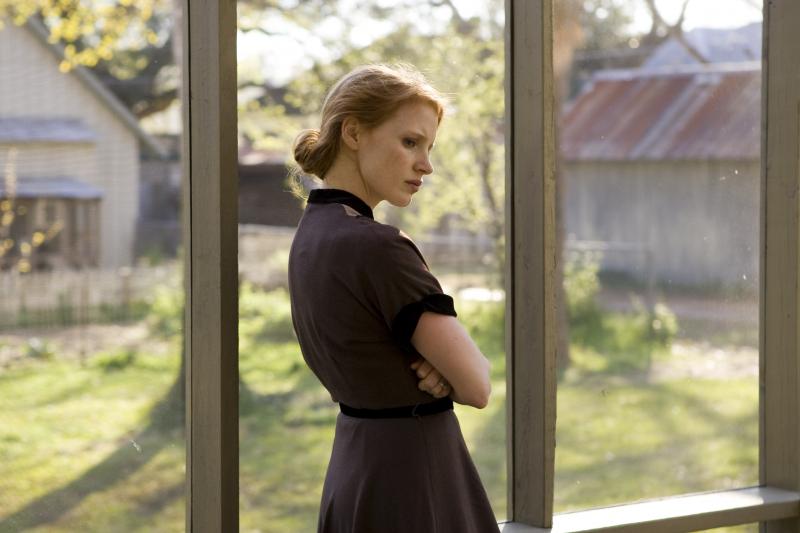
Jessica Chastain as Mrs. O'Brien in
Terrence Malick's epic drama "The Tree Of Life" .
Merie Wallace/Fox Searchlight
As luminous and otherworldly beautiful as "The Tree Of
Life" is (credit wondrous photography by Emmanuel Lubezki and amazing special
visual effects that Doug Trumbull would marvel at), Mr. Malick's film is not
without its missteps. There are two curious scenes, one especially so.
One features a species. When the scene appears it seems an odd, mystifying
presence that almost grinds the film to a complete halt. Only later on in
reflection does its existence symbolize tension amongst the film's featured
family.
The other scene comes near the film's end but thankfully stops short of becoming
the kind of stage curtain call moment it threatens to be. Had "The Tree Of
Life" ended the way of say, James Cameron's "Titanic" it would have been
difficult for me to like or appreciate it or Mr. Malick's intentions. In
Mr. Malick's meditation an elysian moment of emotion and belonging provide a
small measure of solace in a sobering, though neither somber nor sad film, yet
strangely enough this scene is also the film's sole weak link.
While some will note inescapable similarities at times to
Mr. Kubrick's "2001: A Space Odyssey" (and to a much lesser extent Darren
Aronofsky's "The Fountain") in its themes, mood and trajectory, Mr. Malick has
crafted a singular, extraordinary achievement. He engineers a spiritual
poetic odyssey that reaches our hearts and gets us to think about concrete
issues often using abstract pictures to spur on and explode thought rather than
manufacture or manipulate it. In witnessing these images and hearing the
whisper of words we are compelled to both think and absorb.
Other filmmakers may have used stock footage and fire-and-brimstone imagery.
Mr. Malick uses visions more at home in nature documentaries and discharges them
not as gap-fillers but as illustrations of life continuum, from natural
selection to primal existence to survival in an otherwise empty,
sparsely-dialogued film.
The biggest challenge for many, including those familiar with Mr. Malick's work,
will be whether the spectacular imagery is a coherent enough fit with the events
surrounding a strict, cold-hearted father whose shortcomings help force one of
his sons to re-evaluate and revisit his life and origins.
That said, "The Tree Of Life" is not about resolving a story, nor does it
contain a "standard" story in the formal sense. Yet it is unabashedly
about thought, contemplation, investigation and meditation, something missing
from a lot of the most well-intended American film dramas. As a method or
process Mr. Malick as a writer has never truly indulged in standard plot points.
There are more obvious "plot" points in Malick films like "Badlands" but even
more so than before narrative is not a part of the new film's equation.
"Days Of Heaven" may be the most beautiful of Mr. Malick's films but "The Tree
Of Life" is as beautiful, absorbing and thoughtful as any film you'll see in
2011.
Thought -- about God, the DNA of life and its whys and hows,
and the struggle for reconciliation between the natural and parental influences
within -- flows as the singular or overarching character of "The Tree
Of Life", permeating the mind, traveling across the film's epochs and ages like
a whispering, marinating nugget of conscience.
"The Tree Of Life" isn't so much showy as it is ruminative. The
visualizations are an accompanying thought in and of themselves. The fact
that a narrative is absent enhances, not diminishes, the idea that the filmmaker
is absolutely sincere about his art and its motivations. Mr. Malick
continues to use images in such a supremely efficient manner: none of the images
are on screen longer than they need to be, and they are no less necessary than
are the actors in the film. Nor do the images subsume the actors.
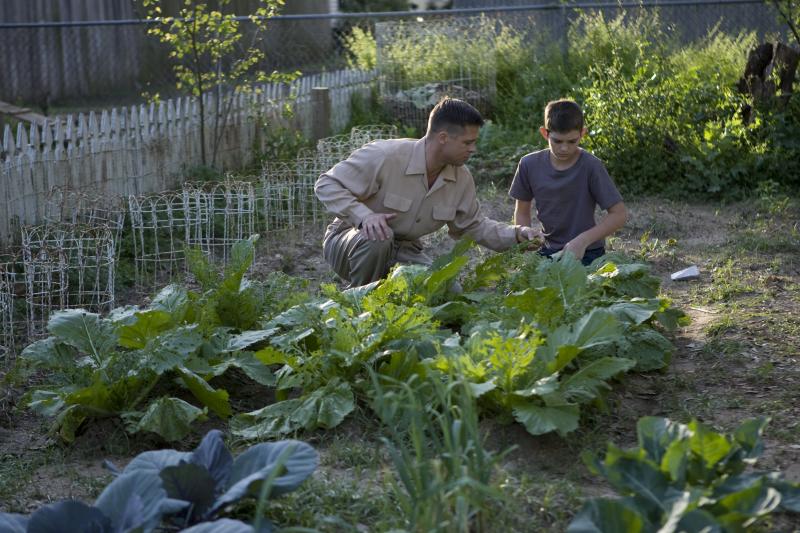
Brad Pitt as Mr. O'Brien and Hunter
McCracken as young Jack in "The Tree Of Life" .
Merie Wallace/Fox Searchlight
Mr. Malick, known as a very shy, reserved and deeply sensitive soul, asks the
questions which can be anxiety-ridden yet doesn't represent the issues behind
those questions in an anguished fashion. Some filmmakers would have gone
down a path of having to use images illustrating anguish, anger and confusion,
or would have employed a frenzied, unruly style or asked their actors to play
frustrated, beleaguered beings weighted down in existential crisis.
Questions about existentialism are present in "The Tree Of Life" but the
exploration is a cerebral exercise, not a purposefully orchestrated variable
outwardly shaped by the performances of the film's actors, who are often
distanced in a same or different time and place from Jack in his younger and
older editions. The distance is shrewdly exemplified by Mr. Lubezki's
distinct camerawork.
A lot of things you glimpse in "The Tree Of Life" may make no sense at all.
Then again, life makes no sense either: the events that happen in it, the things
that shape it, the pains that define it, the truths that enhance it and the love
that protects it. There is however, purpose in life. And Jack tries
to find it, even as he is tempted by the opportunity to find death instead.
Above all, Jack seeks peace, peace in his own heart and soul.
At all times "The Tree Of Life" is as fragile as the questions that pepper it.
Throughout, Mr. Malick journeys through this difficult and challenging terrain
with great sensitivity. He gives the viewer time to breathe and reflect.
The film is neither pretentious nor glamorous. "The Tree Of Life" is as
gentle, bright, cloudy and moody as the ever-changing weather. Each image
in it floats and bursts with life, including the most innocuous or sobering
visuals. What you see is absolutely awe-inspiring.
So just how do you make a two hour-and-20-minute film about
life and its whys and hows, and make it transfixing, thought-provoking and
sustaining entertainment? You take chances as Mr. Malick has done, making
a film that is akin to Derek Jarman's "Blue" in some of its intonation and
poetry but is more alive with movement, light, involvement and far greater
scope, animation and scale even as it remains as personal and intimate as Mr.
Jarman's film.
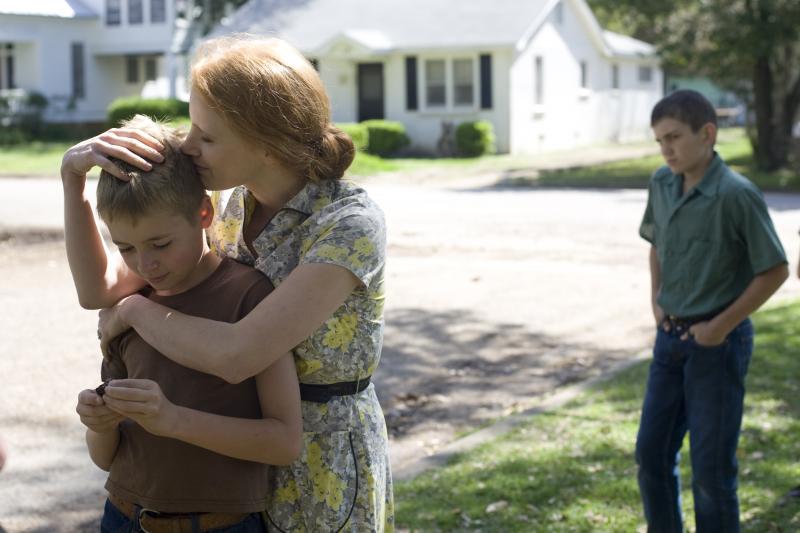
Laramie Eppler as R.L., Jessica
Chastain as Mrs. O'Brien and Hunter McCracken as young Jack in "The Tree Of Life" .
Merie Wallace/Fox Searchlight
For all its free-associational imagery "The Tree Of Life" is always talking to
us as an audience literally, and in conventional ways. Whispering voices,
often barely audible are always talking to us. There is very little
technology present, no TV, which was born in the 1950s, and barely a radio to be
heard.
With any film, especially any well-executed one, which "The Tree Of Life" is,
the range of possibility of interpretation is endless. Since Mr. Malick
doesn't designate a peculiar strain of logic we are left to sort through the
palette of indelible visions. (Other than Mr. Penn's Jack there's no real
back story for the other characters.)
"The Tree Of Life", another impressionistic Malick collage
that will gain more respect in a decade or two, got me to think, contemplate,
and not do so solely for the sake of the movie, but also for my own life, family
and the precious people in it. I couldn't help thinking about them as I
watched this extraordinary film. Neither Mr. Malick nor his film take life
for granted, and "The Tree Of Life" shows us that life, in all its cruelty and
vitality is always present and breathing around us.
With this special film Mr. Malick appears to be saying: talk about life, take
time to value life and enjoy it, for it is brief. Question the ways of
life, yes, but make love the center of your soul and appreciate life all the
more in the process. Life will go on, as will love, long after we're all
gone. This is a film that demands repeated viewings and even deeper
contemplation. "The Tree Of Life" is an instant classic, and classically
beautiful Malick.
With: Laramie Eppler, Tye Sheridan, Fiona Shaw, Cole Cockburn.
"The Tree Of Life" is rated PG-13 by the Motion Picture Association Of
America for some thematic material. The film's running time is two hours
and 18 minutes. The film opens in New York and Los Angeles on Friday, San
Francisco and elsewhere on June 3 and across the U.S. and Canada on July 8.
 FOLLOW
FOLLOW
SUBSCRIBE TO THE POPCORN REEL MOVIE
REVIEWS RSS FEED
